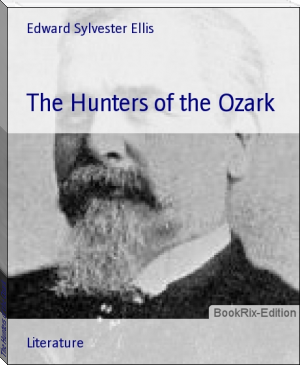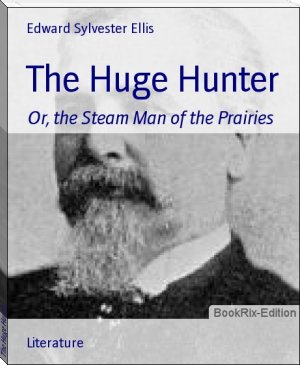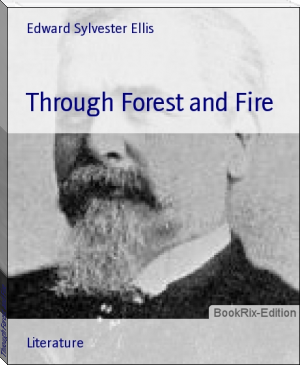The Hunters of the Ozark - Edward Sylvester Ellis (children's ebooks online .txt) 📗

- Author: Edward Sylvester Ellis
Book online «The Hunters of the Ozark - Edward Sylvester Ellis (children's ebooks online .txt) 📗». Author Edward Sylvester Ellis
"FREDERICK LINDEN,
Grevil."
He then handed it to Deerfoot, saying:
"There is no special hurry, and if you are in the neighborhood of Greville, and can make it convenient to leave that at my house, it will be a great kindness to me."
"If the Great Spirit does not will different it shall be in his hands before the setting of three more suns, but," added Deerfoot, looking at the superscription on the back of the paper, "has not my brother made a mistake?"
"What do you mean?"
"When Deerfoot writes the word 'Greville,' he adds two letters more than does my brother; perhaps, though, Deerfoot is wrong."
No pen can describe the amazement that appeared on the faces of Linden and Bowlby. Here was a young Indian teaching a white man old enough to be his father how to spell in the English language! Was the like ever known?
For a full minute neither of the hunters spoke. They were sitting on the log, while Deerfoot was standing in front of them. He held his rifle in his right hand and the folded piece of paper in his left, while he looked inquiringly down in the faces of the two men, whose mouths and eyes were open, as though they could not believe the evidence of their own senses. Finally, with a deep sigh, Linden slowly rose to his feet--
"Well, by gracious! if that don't beat every thing! Do you mean to say that you can read _writing_? Impossible!"
Then, as if still in doubt, he reached out and took the paper. Drawing a stump of a lead pencil from his pocket he completed the word properly, opened the paper, and handing it back to the Indian, said:
"Let's hear you read _that_."
"My brother writes so that any one can read his words," observed the young Shawanoe by way of introduction, and then in a low, soft voice he read the brief note from beginning to end.
Bowlby, who had not yet spoken, seemed unable to express his emotions. Unable himself to read, the attainment of the Indian was almost past belief. As the best thing, therefore, that he could do, he solemnly reached out his hand to Linden and shook it with great earnestness. Settling painfully back on the log, he nodded his head several times as if he was almost overcome, as indeed was the case.
I should state at this point that although Linden had not seen fit to make it known, he had heard of Deerfoot the Shawanoe long before. He knew of some of his exploits in Kentucky, as well as those of later years on the western bank of the Mississippi (which are told in the "Young Pioneer" and the "Log Cabin Series"), but he had never met the youth, nor had he ever heard or suspected that he knew how to read and write. Taking hold of his arm, he asked:
"Where in the name of all that is wonderful did you learn that? When I wrote to Fred that I would tell him some things about you I did not know of the most extraordinary of all--that which I have just seen. Sit right down here, between me and Jim, and let us know all about it."
Deerfoot held back, but yielded, and finally answered in his modest way the numerous questions with which he was plied. Bowlby had managed to find his tongue, and his queries were about twice as numerous as those of his companion. By the time that Deerfoot had time to rest, Hardin came back, and there was little left to tell.
The Shawanoe had captured the Hunters of the Ozark. They insisted that he should stay to dinner with them, and he did so. Then he was badgered to enter into a shooting match. All were fine marksmen, and Linden was the best shot in Greville. Using his own rifle, Deerfoot beat every one of them. Then he exchanged weapons and allowed the crippled Bowlby to rest his piece, and the Shawanoe beat all three just as badly as before. They were delighted, and slapping him on the back, asked him to spend a week with them, but he shook his head.
The sun was already beyond the meridian, and there were reasons for his departure which he could not explain. They liked him too well to insist, though they made him promise that on the first chance he would make them a visit. Then Deerfoot gravely pressed hands with all and quickly disappeared in the woods, taking the trail that led toward Greville. You have already learned about his meeting with Terry Clark and Fred Linden.
CHAPTER IX.
A MISHAP.
Fred Linden and Terry Clark were alarmed when, on their way home, they came to the creek across which they had paddled only a short time before. It was then the comparatively shallow stream that was scarcely an obstacle in their path; now it was a rushing torrent, whose volume was increasing with great rapidity. The sinuosities of the creek had caused it to gather in a large part of the rain that had fallen some miles away, and its usual boundaries were overflowed.
It was well that Fred had tied his canoe to the tree that was quite a distance from the stream, for had he not done so it would have been swept away like an egg shell. As it was, the water had reached the base of the tree, while the boat was bobbing up and down almost in a straight line with the course of the creek, as though it was tugging to get loose.
"My gracious, Terry!" said Fred, "this is a little worse than I expected; it is going to be hard work to get across."
"Ye are right for once," added the other, gravely shaking his head; "them rapids are a little closer than I loike."
"It seems to me," added Fred, who was unwilling to admit that he was afraid to try the task, "that I have gone over the creek when it was just as high and rapid, and have crossed at this place, too."
"Who swung the paddle?"
"Father did once and Mr. Bowlby at another time."
"Did ye iver manage the paddle yersilf when the creek got onto one of its tears?"
"I don't remember that I have, but that has been only because the need did not arise; I am not afraid to try it, even if you are."
"Who said I was afraid?" demanded Terry; "I'm riddy to hop into the boat and sway the paddle mesilf, and I'll do it, too."
He stepped into the water, which was up to his shoe tops, and began drawing in the rawhide rope which held the frail boat from breaking away. His companion laughed and said nothing until the canoe was at their feet and drawn up on the land away from the rushing current.
"Don't be quite so touchy, Terry; that boat belongs to me and I can handle the paddle better than you; anyway I shall try to take us to the other side, and all that you have to do is to keep those limbs and trees from capsizing us."
The time occupied in pulling the boat to the spot had given the Irish lad a chance to regain his usual good nature, and he made no protest against the decision of his companion, though Terry was no unskillful handler of the paddle himself.
The creek was probably over a hundred feet wide, and the roiled current abounded with limbs and trees that swung up and down, sometimes out of sight and then popping up again, as though they were frolicking in the swift waters. It would require a strong arm and a cool head to force the birchen craft through these obstacles to the shore on the other side. It must be admitted, too, that it was a piece of imprudence on the part of the lads, who would have been wiser had they quietly waited where they were until the overflow exhausted itself. A stream that rises so fast subsides with the same quickness, and long before nightfall the creek would shrink to proportions that would take away all peril to any one in paddling across.
They would have been compelled to go a long distance up stream before finding a place where the crossing was easier, and it would have been almost impossible to drag the canoe thither. They would have held fast to one end of the rope and allowed it to dance through the rapids, so as to allow them to make the passage below, where the great peril was removed, had they not known that the chances were ten to one that it would be snatched from their grasp, thus shutting them out altogether.
Looking up and across the sloping clearing, the cabins forming the settlement of Greville could be seen at no great distance. From several of the stone chimneys the smoke was curling lazily upward, and now and then glimpses could be caught of persons moving hither and thither, but no one appeared to be looking in the direction of the creek, or if any one was doing so, he saw nothing of the two boys standing on the further shore and debating with themselves the best course to follow. At any rate no one would think they were unable to take care of themselves.
Both Fred and Terry knew that there was but one prudent plan to follow; that was quietly to wait where they were until near night, by which time all danger would be gone. But neither proposed the course nor made mention of it. It is natural for youth to be rash, and there was a semblance of timidity in such a shrinking back that was repellent to American and Irish lad alike. And so you will understand how it was that each showed an eagerness to enter into the contest with the angry current.
You will see, too, how foolish they were, when I tell you that during the few minutes they stood by the tree to which the rope had been tied discussing the situation, they saw the proof that the creek was subsiding. There was a perceptible lowering of the surface, as was shown by the soiled line against the trunk of the tree. Even Terry, when he looked down, observed that he was not standing in quite as deep water as he was a few minutes before. No danger, however, of his making mention of it.
It took but a minute or so to untie the long thong that was wrapped about the limb, and then, as Fred was on the point of flinging the coil into the bottom of the boat, the end of which was drawn up on the bank, and to take up the paddle and push off, Terry, with some excitement, caught his arm and said:
"Plase wait a minute, will ye?"
"What for?"
"I'll not be gone long; howld the boat only for a twinkling."
He ran a dozen steps or so from shore to where was the stump of a tree that had probably been splintered by a thunder-bolt, and around which sprouted a number of bushes that were dense enough to hide a large object within. Carefully parting these, Terry laid down his rifle and the bell, and then as carefully smoothed the undergrowth in place. Then
Grevil."
He then handed it to Deerfoot, saying:
"There is no special hurry, and if you are in the neighborhood of Greville, and can make it convenient to leave that at my house, it will be a great kindness to me."
"If the Great Spirit does not will different it shall be in his hands before the setting of three more suns, but," added Deerfoot, looking at the superscription on the back of the paper, "has not my brother made a mistake?"
"What do you mean?"
"When Deerfoot writes the word 'Greville,' he adds two letters more than does my brother; perhaps, though, Deerfoot is wrong."
No pen can describe the amazement that appeared on the faces of Linden and Bowlby. Here was a young Indian teaching a white man old enough to be his father how to spell in the English language! Was the like ever known?
For a full minute neither of the hunters spoke. They were sitting on the log, while Deerfoot was standing in front of them. He held his rifle in his right hand and the folded piece of paper in his left, while he looked inquiringly down in the faces of the two men, whose mouths and eyes were open, as though they could not believe the evidence of their own senses. Finally, with a deep sigh, Linden slowly rose to his feet--
"Well, by gracious! if that don't beat every thing! Do you mean to say that you can read _writing_? Impossible!"
Then, as if still in doubt, he reached out and took the paper. Drawing a stump of a lead pencil from his pocket he completed the word properly, opened the paper, and handing it back to the Indian, said:
"Let's hear you read _that_."
"My brother writes so that any one can read his words," observed the young Shawanoe by way of introduction, and then in a low, soft voice he read the brief note from beginning to end.
Bowlby, who had not yet spoken, seemed unable to express his emotions. Unable himself to read, the attainment of the Indian was almost past belief. As the best thing, therefore, that he could do, he solemnly reached out his hand to Linden and shook it with great earnestness. Settling painfully back on the log, he nodded his head several times as if he was almost overcome, as indeed was the case.
I should state at this point that although Linden had not seen fit to make it known, he had heard of Deerfoot the Shawanoe long before. He knew of some of his exploits in Kentucky, as well as those of later years on the western bank of the Mississippi (which are told in the "Young Pioneer" and the "Log Cabin Series"), but he had never met the youth, nor had he ever heard or suspected that he knew how to read and write. Taking hold of his arm, he asked:
"Where in the name of all that is wonderful did you learn that? When I wrote to Fred that I would tell him some things about you I did not know of the most extraordinary of all--that which I have just seen. Sit right down here, between me and Jim, and let us know all about it."
Deerfoot held back, but yielded, and finally answered in his modest way the numerous questions with which he was plied. Bowlby had managed to find his tongue, and his queries were about twice as numerous as those of his companion. By the time that Deerfoot had time to rest, Hardin came back, and there was little left to tell.
The Shawanoe had captured the Hunters of the Ozark. They insisted that he should stay to dinner with them, and he did so. Then he was badgered to enter into a shooting match. All were fine marksmen, and Linden was the best shot in Greville. Using his own rifle, Deerfoot beat every one of them. Then he exchanged weapons and allowed the crippled Bowlby to rest his piece, and the Shawanoe beat all three just as badly as before. They were delighted, and slapping him on the back, asked him to spend a week with them, but he shook his head.
The sun was already beyond the meridian, and there were reasons for his departure which he could not explain. They liked him too well to insist, though they made him promise that on the first chance he would make them a visit. Then Deerfoot gravely pressed hands with all and quickly disappeared in the woods, taking the trail that led toward Greville. You have already learned about his meeting with Terry Clark and Fred Linden.
CHAPTER IX.
A MISHAP.
Fred Linden and Terry Clark were alarmed when, on their way home, they came to the creek across which they had paddled only a short time before. It was then the comparatively shallow stream that was scarcely an obstacle in their path; now it was a rushing torrent, whose volume was increasing with great rapidity. The sinuosities of the creek had caused it to gather in a large part of the rain that had fallen some miles away, and its usual boundaries were overflowed.
It was well that Fred had tied his canoe to the tree that was quite a distance from the stream, for had he not done so it would have been swept away like an egg shell. As it was, the water had reached the base of the tree, while the boat was bobbing up and down almost in a straight line with the course of the creek, as though it was tugging to get loose.
"My gracious, Terry!" said Fred, "this is a little worse than I expected; it is going to be hard work to get across."
"Ye are right for once," added the other, gravely shaking his head; "them rapids are a little closer than I loike."
"It seems to me," added Fred, who was unwilling to admit that he was afraid to try the task, "that I have gone over the creek when it was just as high and rapid, and have crossed at this place, too."
"Who swung the paddle?"
"Father did once and Mr. Bowlby at another time."
"Did ye iver manage the paddle yersilf when the creek got onto one of its tears?"
"I don't remember that I have, but that has been only because the need did not arise; I am not afraid to try it, even if you are."
"Who said I was afraid?" demanded Terry; "I'm riddy to hop into the boat and sway the paddle mesilf, and I'll do it, too."
He stepped into the water, which was up to his shoe tops, and began drawing in the rawhide rope which held the frail boat from breaking away. His companion laughed and said nothing until the canoe was at their feet and drawn up on the land away from the rushing current.
"Don't be quite so touchy, Terry; that boat belongs to me and I can handle the paddle better than you; anyway I shall try to take us to the other side, and all that you have to do is to keep those limbs and trees from capsizing us."
The time occupied in pulling the boat to the spot had given the Irish lad a chance to regain his usual good nature, and he made no protest against the decision of his companion, though Terry was no unskillful handler of the paddle himself.
The creek was probably over a hundred feet wide, and the roiled current abounded with limbs and trees that swung up and down, sometimes out of sight and then popping up again, as though they were frolicking in the swift waters. It would require a strong arm and a cool head to force the birchen craft through these obstacles to the shore on the other side. It must be admitted, too, that it was a piece of imprudence on the part of the lads, who would have been wiser had they quietly waited where they were until the overflow exhausted itself. A stream that rises so fast subsides with the same quickness, and long before nightfall the creek would shrink to proportions that would take away all peril to any one in paddling across.
They would have been compelled to go a long distance up stream before finding a place where the crossing was easier, and it would have been almost impossible to drag the canoe thither. They would have held fast to one end of the rope and allowed it to dance through the rapids, so as to allow them to make the passage below, where the great peril was removed, had they not known that the chances were ten to one that it would be snatched from their grasp, thus shutting them out altogether.
Looking up and across the sloping clearing, the cabins forming the settlement of Greville could be seen at no great distance. From several of the stone chimneys the smoke was curling lazily upward, and now and then glimpses could be caught of persons moving hither and thither, but no one appeared to be looking in the direction of the creek, or if any one was doing so, he saw nothing of the two boys standing on the further shore and debating with themselves the best course to follow. At any rate no one would think they were unable to take care of themselves.
Both Fred and Terry knew that there was but one prudent plan to follow; that was quietly to wait where they were until near night, by which time all danger would be gone. But neither proposed the course nor made mention of it. It is natural for youth to be rash, and there was a semblance of timidity in such a shrinking back that was repellent to American and Irish lad alike. And so you will understand how it was that each showed an eagerness to enter into the contest with the angry current.
You will see, too, how foolish they were, when I tell you that during the few minutes they stood by the tree to which the rope had been tied discussing the situation, they saw the proof that the creek was subsiding. There was a perceptible lowering of the surface, as was shown by the soiled line against the trunk of the tree. Even Terry, when he looked down, observed that he was not standing in quite as deep water as he was a few minutes before. No danger, however, of his making mention of it.
It took but a minute or so to untie the long thong that was wrapped about the limb, and then, as Fred was on the point of flinging the coil into the bottom of the boat, the end of which was drawn up on the bank, and to take up the paddle and push off, Terry, with some excitement, caught his arm and said:
"Plase wait a minute, will ye?"
"What for?"
"I'll not be gone long; howld the boat only for a twinkling."
He ran a dozen steps or so from shore to where was the stump of a tree that had probably been splintered by a thunder-bolt, and around which sprouted a number of bushes that were dense enough to hide a large object within. Carefully parting these, Terry laid down his rifle and the bell, and then as carefully smoothed the undergrowth in place. Then
Free e-book «The Hunters of the Ozark - Edward Sylvester Ellis (children's ebooks online .txt) 📗» - read online now
Similar e-books:





Comments (0)